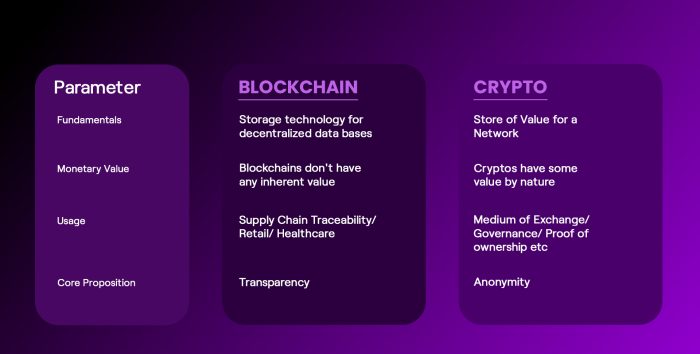https://nasacademy.com/blog/article/blockchain-vs-cryptocurrency-are-they-the-same

Back in the mid-90s, when the internet was catching up, many adopters used to associate the internet with a single use case. For example, some people used the internet for online reading, so they thought of the internet as a source of information. Others used the internet for emails and other forms of online communication.
This went on for a while, until some companies started running businesses based on the internet. That was when the world realized that the internet is a fundamental technology and there are multiple use cases built on top of it.
Currently, Blockchain technology is at a similar point. Whenever people think of Blockchain, they think of Bitcoin. But assuming that Bitcoin is a Blockchain would be equivalent to saying that email is the internet or social media is the internet.
Bitcoin (or any other cryptocurrency) is just a use case of the Blockchain technology. There is so much more to Blockchain than just cryptocurrency – and we cannot stress that enough. So in this article, we decided to talk about these differences. Are Blockchain and Cryptocurrency the same? Let us find out.
For understanding the differences between Blockchain and Cryptocurrency, let us review each of these technologies separately.
Simply put, Blockchain is a new form of database. What is a database you ask? A database is an organized collection of data, so that it can be easily accessed and managed. You can organize data into tables, rows, columns etc. And each of our interactions with the internet is generating data.
Be it something as simple as commenting on a post, to something as complicated as uploading a video. There is humongous data being generated every second. This calls for efficient data management which comes under the purview of databases.
The only issue with these databases is that they are stored on a centralized server. This server is controlled and managed by a single authority which leads to following problems:
Since data is stored at a single location, it essentially puts the system into a risk of failure. If something goes wrong at these locations, the data might be lost. While big tech companies like Amazon and Google deploy the best technology out there, to ensure nothing like this happens, there have been incidents where networks like Facebook have suffered outages for over 12 hours.
These companies also have backup servers to ensure that data is not lost completely, but managing such an arrangement involves significant costs.
Imagine a situation where you cannot Google, “what happened to Google?” Unlikely, but not impossible.
A central authority controlling so much information is never a good idea. Just to put that in perspective, currently Facebook knows more about us than the governments of our respective countries. (This is when we have volunteered to share our private information with the government.)
Another example of power flexing could be the recent incident of Twitter and Facebook banning Donald Trump from their platforms. This tells us that the final plug still remains in the hands of the owners of these platforms.
This is one of the key reasons that the EU has come up with a detailed set of GDPR laws where they try to cap this power equation.
Since these centralized servers are in direct control of a single authority, there is literally nothing that can stop them from running their own agenda. For example, Facebook could execute a campaign to glorify its image and it would instantly reach 2.9 billion people that flock on its platform daily.
Alternatively, they could block all the news that is trying to blemish Facebook.
This is just an example. Try replacing Facebook with anything else in the world and we might have a huge problem at hand. This could lead to extreme polarization.
Blockchain technology tries to democratize the database. Every individual participating in a Blockchain network can validate the transactions. This data is also available in the public domain for anyone to come and verify for themselves.
The data is stored on these blockchains in the form of blocks stacked on the top of the other. Each individual has a copy of this blockchain at any given point in time. Therefore, if someone tries to dupe the system by changing the data in a block, their copy would become different from the others and, hence, disregarded from the Blockchain.
Because this technology is run by multiple people (called nodes) at the same time instead of one, it is a decentralized form of database, solving the following problems:
This time around, the entire show is run by multiple parties instead of one central authority. Therefore, even if a few nodes fail, the blockchain isn’t impacted much. The show must go on. This is in contrast to centralized servers where the entire system is sabotaged if a location is compromised.
There is a rule of thumb related to power when it comes to human psychology.
Whenever you ask a group of people that who should be in charge, they’d always say, “I should be in charge!”
If you eliminate that option, the next best alternative is, “No one should be in charge.”
The Blockchain technology lives by the second option here. With no single person or entity having the ability to make changes to the network at will, there is an equal distribution of power.
Yet again, Blockchains are a peer-to-peer technology in its truest sense. There is no way you can push or restrict certain narratives based on your personal gains. While this might be a double edged sword, it is surely worth a shot.
While this gives you an overview of Blockchain technology, here is a dummy’s guide if you want to dive deeper.
Cryptocurrency is the digital or virtual currency that is secured by cryptography and built on the top of Blockchain technology. This makes Cryptocurrency hack-proof and impossible to ‘double spend.’
Think of it like this: unlike the real world, there is no scarcity of resources on the internet. One could download an image, copy a piece of text, or republish a video. There is literally nothing that can stop them. So while the idea of having digital money seems very interesting, what if someone simply recreated multiple copies of that money? It won’t make sense, right?
That is where Blockchain technology jumps in and empowers people (nodes) to ensure that digital money is not coming out of anywhere. All the transactions happening in the system are legit and thoroughly validated by the people.
This led to the birth of the first ever digitally scarce, hack-proof, digital money called ‘Bitcoin.’
While Bitcoin solved the problem of centralization, its use cases were limited to that only.
Hence, the idea of Ethereum was conceived by Vitalik Buterin back in 2012. Genesis was to leverage the underlying Blockchain technology to create more use cases of digital money.
Vitalik once said in an interview that “If Bitcoin is a calculator, Ethereum is a smartphone.”
This was made possible by enabling the ability to write and run smart contracts on the top of Ethereum Blockchain.
Ethereum is currently the most widely used Blockchain for running decentralized applications, or dApps, on the top of it. However there were some concerns around the scalability of Ethereum.
Which is why we now have multiple contenders in the market solving for these issues. Each of these blockchains have their own native token and offer different approaches to capture the market.
As discussed above, Cryptocurrency is a subset of the overall bigger picture of Blockchain. Currently, the immense euphoria around cryptocurrency often overshadows the immense potential of Blockchain technology.
And the biggest example of this could be the way this space is referred to. No one calls it the Blockchain industry, more often than not it is called the ‘crypto space.’
Let us discuss some key differences between Blockchain vs. Cryptocurrency:

Well, now that you are aware of the difference between the two hottest buzz words of this decade, go ahead and flaunt. Own those dinner table conversations. Who knows, might as well monetize it. Wondering how? Here’s a Nas Academy Web3 Community that can help you get started.
By Admin Nas Academy